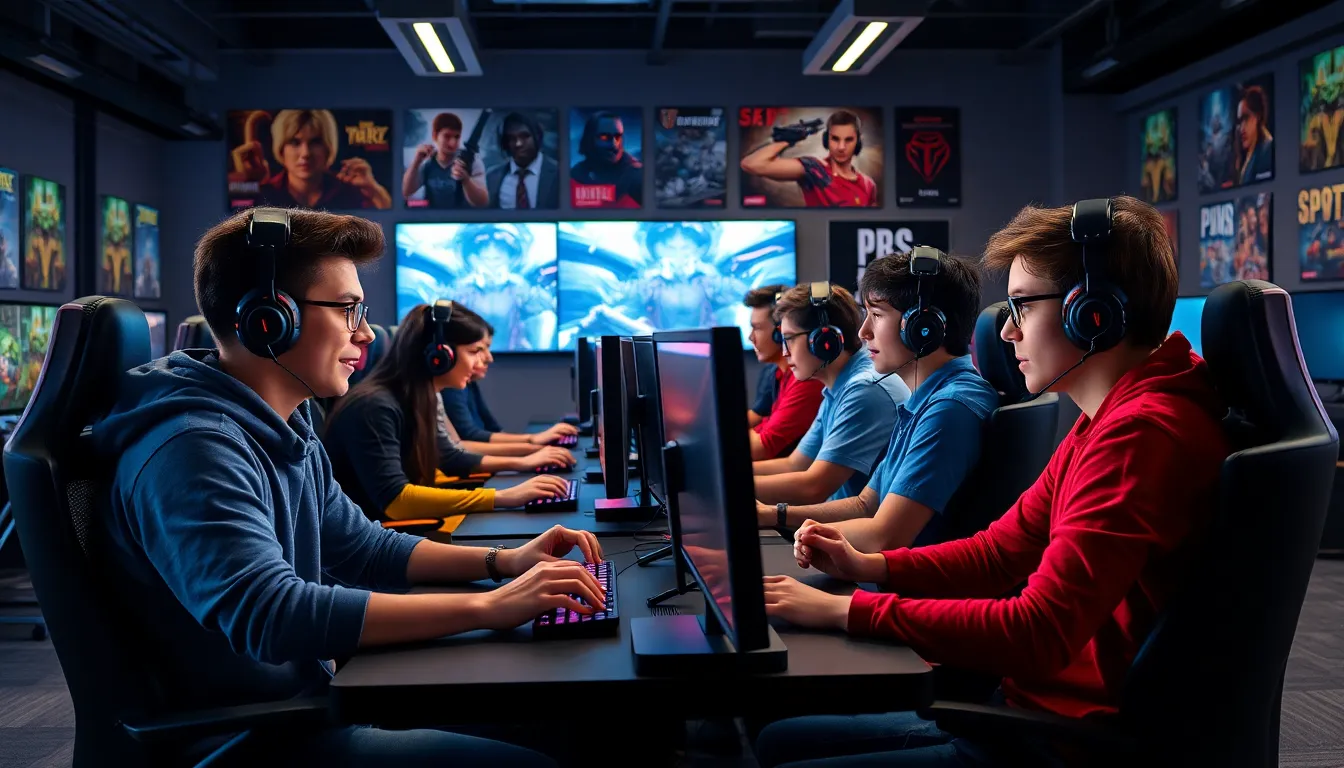In a world where gaming isn’t just a pastime but a legitimate career path, colleges are leveling up with esports teams. Gone are the days when parents worried about their kids glued to screens; now they’re cheering them on from the sidelines. With scholarships, competitive play, and a community that rivals any sports team, these colleges are proving that gaming can lead to serious opportunities.
Colleges With Esports Teams
Esports has gained significant traction in higher education settings. Colleges are increasingly recognizing the potential of competitive gaming, providing students with opportunities to excel in this field. Rising numbers of institutions now offer dedicated esports teams and arenas equipped with the latest technology.
Many universities provide scholarships specifically for esports athletes, mirroring traditional sports programs. Funding for these teams comes from various sources, ensuring sustainability and growth. Awards are often based on skill, teamwork, and participation, encouraging diverse talent to join.
The establishment of governing bodies, such as the National Association of Collegiate Esports (NACE), has brought structure to collegiate esports. This organization helps set standards and facilitate competition among member schools. Participation in tournaments allows students to showcase their talents on a larger stage.
Students involved in esports benefit from developing teamwork and strategic thinking skills. They’ll often engage in networking opportunities that can lead to careers in gaming-related fields. As esports continues to evolve, academic programs are emerging to study its impact on society, technology, and media.
Engagement with esports fosters a sense of community among students, similar to that found in traditional athletics. Clubs and events contribute to campus life, enabling students to connect over shared interests. This inclusive atmosphere promotes mental health and well-being, as participants support each other both in-game and out of the gaming environment.
Increasingly, colleges view esports not just as a pastime but as a vital part of their cultural fabric. The impact of esports in higher education reflects broader trends in society, indicating that gaming is here to stay.
Benefits of Joining Esports Teams

Esports teams in colleges provide several advantages to student participants. Students can experience both academic support and enhanced community engagement.
Academic Support
Colleges with esports teams often offer tailored academic resources for student-athletes. Support includes tutoring for courses, study halls, and academic advisors focused on balancing gaming and academics. Students can access programs designed to enhance time management skills and promote healthy lifestyles. Scholarship opportunities reward dedicated players, allowing them to finance their education while pursuing their passion. Many schools also monitor academic performance closely, ensuring students maintain eligibility to compete. This emphasis on academics helps students develop a strong sense of responsibility, which often translates to success in their studies.
Community Engagement
Esports teams foster a sense of belonging among students through shared interests and goals. Participants can build strong relationships with teammates and peers, creating lasting friendships. Colleges often host events, tournaments, and watch parties that bring students together, enhancing campus involvement. Networking opportunities arise through interaction with industry professionals and fellow gamers, paving the way for future career prospects. By joining esports teams, students contribute to a vibrant campus culture, promoting inclusivity and unity. This community support also plays a crucial role in improving mental health by reducing feelings of isolation and enhancing the overall student experience.
Top Colleges with Esports Teams
Esports teams are thriving within college environments, with both public universities and private colleges establishing significant programs. These institutions provide students with opportunities to excel in competitive gaming while pursuing their academic goals.
Public Universities
Public universities are leading the charge in esports development. Schools like the University of California, Irvine, and Georgia State University offer dedicated esports arenas and host competitive tournaments. These programs often provide scholarships, helping talented gamers finance their education while fostering teamwork and strategic thinking. Other notable public institutions, such as the University of Texas at Dallas and the University of Utah, also prioritize esports, encouraging students to engage in healthy competition and build community.
Private Colleges
Private colleges are making impressive strides in the esports realm. Schools such as Robert Morris University and Champlain College boast robust esports programs, complete with coaching staff and state-of-the-art facilities. These institutions enhance the academic experience by partnering with industry leaders, preparing students for careers in gaming and technology. Additionally, private colleges often focus on individualized support and tailor programs for academic success, ensuring that esports athletes maintain a balance between their studies and gaming commitments.
Scholarship Opportunities for Esports Athletes
Esports athletes have access to a range of scholarship opportunities across many colleges. Many institutions now offer financial aid specifically designed for students who excel in gaming. This funding mirrors traditional sports scholarships, providing monetary support that can significantly reduce college expenses.
Programs vary by school, with some offering full scholarships covering tuition, while others provide partial awards. Schools like the University of California, Irvine lead in this area, granting significant financial packages through their esports teams. Additionally, Georgia State University stands out with its dedicated esports scholarships aimed at attracting talented gamers.
Scholarship eligibility often includes performance criteria, as colleges seek students who demonstrate skill in competitive gaming. Students might also need to maintain a certain GPA to keep their scholarship. Recipients can benefit from academic support services, which assist with balancing gaming commitments and studies.
Private colleges are also joining the trend, with institutions like Robert Morris University providing scholarships alongside individualized academic coaching. Champlain College emphasizes a holistic approach, offering opportunities for personal growth alongside competitive gaming.
Networking opportunities arise from being part of an esports team, where athletes can connect with industry professionals. Establishing relationships within the gaming community enhances prospects for internships and career placements in gaming-related fields. Colleges recognize the dedication of esports athletes, which leads to the establishment of more comprehensive scholarship programs.
The support systems created by these scholarships help students succeed in both gaming and academics. Many colleges actively engage students, fostering a sense of belonging and enhancing their overall college experience.
Future of Esports in Colleges
Esports in colleges continues to grow, signaling a promising future for the discipline. The increasing number of institutions establishing esports teams illustrates this trend. With more scholarships, colleges are investing in talented gamers, ensuring financial support is available to those who excel in competitive gaming.
In addition, dedicated arenas equipped with the latest technology are becoming common on campuses. These facilities enhance the gaming experience, allowing students to perform at their best. Universities are taking notice of the valuable skills developed through esports, such as teamwork, strategic thinking, and communication.
Networking opportunities are expanding as well. Students engaged in esports can connect with industry professionals, often leading to careers in gaming and technology sectors. The community formed through esports enhances campus life, promoting inclusivity and student interaction.
Financial packages, often attached to varsity esports programs, incentivize student participation. Qualified esports athletes can access academic support resources, creating a balanced academic and gaming lifestyle. Schools recognize that fostering both aspects contributes to the well-being of their students.
Governing bodies like the National Association of Collegiate Esports are facilitating intercollegiate competition. These organizations help set standards, further legitimizing esports as a competitive avenue in higher education.
Overall, as acceptance of esports expands, its integration into college culture solidifies. The future of esports in colleges looks bright, with ongoing support, technology advancements, and a focus on the holistic success of student-athletes.
Conclusion
The rise of esports teams in colleges marks a significant shift in how gaming is perceived in higher education. With increasing support from institutions and parents alike, students now have access to opportunities that blend academics and competitive gaming.
As esports programs continue to expand, they not only provide scholarships but also foster a sense of community and belonging among participants. The skills developed through these programs prepare students for a variety of career paths while enhancing their college experience.
With dedicated facilities and a growing network of professionals, the future of esports in colleges looks bright, solidifying its place as an essential component of campus life.



